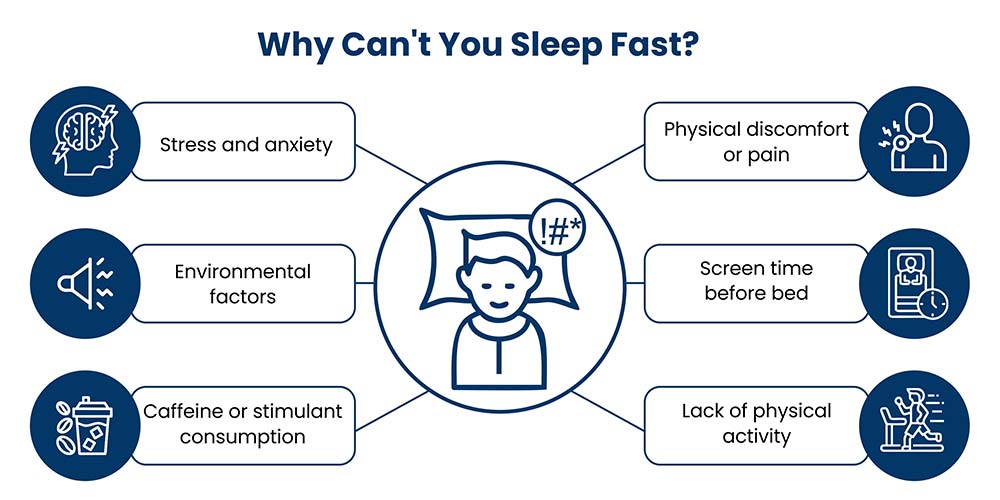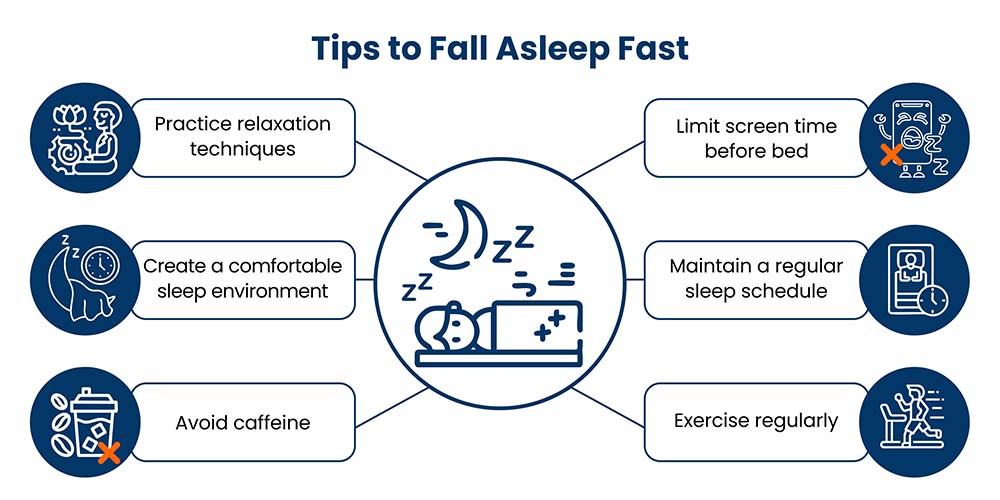Nothing is more aggravating than not being able to fall asleep fast, mainly when a night of good rest is essential for your well-being. Whether the day's worries are bugging you or the inability to sleep, learning a few tricks and techniques for getting that perfect sleep can mean all the difference.
This blog will look at some tried-and-true advice and techniques on how do you fall asleep quickly and wake up completely recharged. You'll find helpful hints for soothing bedtime routines, relaxation techniques, and mindfulness approaches that improve sleep and well-being. So, throw away tossing and turning and have a good night's sleep with tips from the experts!
Possible Reasons for Delay in Sleep
Here are some basic reasons why someone might experience delays in falling asleep:
Stress and Anxiety: Racing thoughts, worry, or anticipation about the day ahead can make relaxing and falling asleep difficult.
Poor Sleep Environment: Excessive noise, uncomfortable bedding, bright lights, or an unsuitable room temperature can disrupt sleep.
Screen Time: Exposure to screens (phones, tablets, computers) emitting blue light can interfere with the production of melatonin, a hormone that regulates sleep.
Irregular Sleep Schedule: Inconsistent bedtimes and wake times can disrupt your body's natural sleep-wake cycle, making it harder to fall asleep at a desired time.
Caffeine and Stimulants: Consumption of caffeine, nicotine, or other stimulants close to bedtime can keep the body and mind alert, delaying sleep onset.
Physical Discomfort: Pain or discomfort from conditions like arthritis, back pain, or digestive issues can make it challenging to get comfortable and fall asleep.
Lack of Physical Activity: Not getting enough physical activity during the day can lead to excess energy at night, making it harder to wind down.
Poor Sleep Routine: Lack of a consistent bedtime routine or engaging in stimulating activities (like intense exercise or heated discussions) before bed can make it challenging to transition into sleep.
Poor Sleep Routine: Lack of a consistent bedtime routine or engaging in stimulating activities (like intense exercise or heated discussions) before bed can make it challenging to transition into sleep.
Medical Conditions: Certain conditions such as insomnia, sleep apnea, restless leg syndrome, or chronic pain can disrupt sleep patterns and delay sleep onset.
Environmental Factors: External factors like excessive light from street lamps, noise from traffic or neighbors, or disruptions in sleeping conditions (such as traveling or staying in unfamiliar places) can affect sleep quality.

15 Best Ways to Sleep Fast
Here are some tips on how to sleep better at night naturally:
1. Establish a bedtime routine
A regular sleep schedule (called “sleep hygiene”) can help you relax and signal your body that it’s time to wind down and sleep. Read a book, soak in a warm bath, do easy yoga or gentle stretching, play soft music—whatever you find relaxing. Avoid stimulating activities or electronic screens as they make it more difficult for your mind to relax and sleep.
2. Create a comfortable sleep environment
Your bedroom environment is one factor that could affect how quickly you can fall asleep. Keep your room calm, quiet, and dark. To block out light, use blackout curtains or an eye mask. Consider using earplugs or a white noise machine to get rid of mask sounds that disturb your peace/sleep. Your mattress and pillows should be comfortable and supportive to aid in sleeping soundly.
3. Limit exposure to screens before bed
The blue light that screens (phones, tablets, computers) emit can mess with your body’s melatonin production (the hormone that regulates sleep-wake cycles). Try to avoid screens for an hour before you go to bed. If you can’t do it, use apps or settings that reduce the amount of blue light emitted (iPhones have Night Shift, and Androids have Night Mode).
4. Manage stress and anxiety
Stress and anxiety may cause sleeping difficulties. Before bed, relaxation techniques like deep breathing, progressive muscle relaxation, meditation, and mindfulness exercises can calm your thoughts. Writing concerns or creating a to-do list for the next day can detoxify your brain from bed stress.
5. Watch your diet and exercise
What you eat and drink, among other factors, may influence the amount of sleep you get. What you eat close to bedtime should not be large or oily. Liquids and caffeine also have an effect, as these substances interfere with sleep. Regular exercise helps bring better quality sleep; however, engaging in a very exhaustive activity close to bedtime may also provoke you to sleeplessness.
6. Stick to a sleep schedule
Sleeping and waking up at the same time daily adjusts your internal body clock to ease you into falling asleep and waking up naturally. You can even stick to your bedtime during the weekends, allowing consistency.
7. Limit naps
While napping can be refreshing, especially if you have had a few nights of insufficient sleep, longer or inconsistent naps can disrupt nighttime sleep. When you need to nap, keep it brief- around 20-30 minutes- and avoid napping close to evening.
8. Use relaxation techniques
Relaxation techniques, such as the tensing and relaxing of each muscle group, visualization techniques (such as imagining a quiet place or scenario), or listening to soothing music, can relax your body and mind and send you to sleep.
9. Consider your sleeping position
Of course, a good position is the key to good and comfortable sleep. Different pillows on the bed are preferable since this implies finding what works best. Some claim that lying on their backside or putting extra pillows under the back develops quality sleep.
10. Try the 4-7-8 breathing method
The 4-7-8 is a relaxation exercise to relax one's mind and body. Practice it this way:
- Sit comfortably or lie down.
- Close your eyes and breathe in from your nose for 4 counts.
- Hold your breath for 7 counts
- Slowly exhale through your mouth for 8 counts, producing a whooshing sound.
- Perform this cycle for four breaths initially and increase to eight breaths. The process calms your breathing, relaxes muscles, and eliminates anxiety, which increases your chances of sleeping.

11. Avoid looking at your clock
Here is another tip if you want to sleep better. Constant time-checking can cause anxiety about how long it takes to fall asleep, keeping you awake. If you can, position the clock so that it's not visible from the bed, or try placing it against you. This will help reduce time stress and help you concentrate on relaxing instead of waiting for the morning.
12. Avoid naps during the day
Naps are beneficial, even just to catch up on a bit of lost sleep. However, long naps or irregular naps tend to interfere with nighttime sleep. Take a nap, which ranges from 20 to 30 minutes, and avoid napping late in the day, which makes it hard to fall asleep as bedtime approaches.
13. Listen to relaxing music
Listening to soft, calming music before bedtime helps to calm your mind and body. Choose slow-tempo music that is gentle on the melodies, preferably by lyricists or those with very soft voices. The volume of the music will not disturb your sleeping environment.
14. Limit caffeine intake
Food with caffeine can delay falling asleep; otherwise, limit your consumption of coffee, tea, and soda to the very early or late hours before you go to sleep. Even though caffeine doesn't make you sleep poorly, it breaks your cycle, which can mean you never quite get to those restorative stages of sleep.
15. Go For Aromatherapy
- Essential Oils to Use
- Lavender: Calming and reduces anxiety.
- Chamomile: Soothes and promotes relaxation.
- Ylang Ylang: Sedative properties, lowers heart rate.
- Sandalwood: Induces calmness and relaxation.
- Frankincense: Promotes peace and deep breathing.
- How to Use
- Diffusion: Use an essential oil diffuser in your bedroom.
- Topical Application: Dilute with a carrier oil and apply to the skin.
- Spray/Mist: Mix with water and lightly mist bedding.
- Aromatic Bath: Add a few drops to a warm bath before bedtime.
Can the Right Pillow Help You Fall Asleep Faster?
A pillow will help you fall asleep better with increased comfort and support. The right pillow helps to keep the posture of your head, neck, and spine correct so that you feel relaxed much more easily with less pain and tension so that your muscles relax easily. It offers physical comfort and brings relaxation so that you drift off more quickly once you eventually become relaxed.
Another feature is that latex or memory foam pillows may provide a soft surface while providing much support by assuming the contours of one's body, thus producing greater overall comfort. Cooling or hypoallergenic pillows also facilitate comfortable sleeping by regulating temperature and removing any potential allergens that may interfere with sleep. Once you find a pillow with all the attributes you want and need for your sleep, it becomes easy to fall asleep and enjoy a peaceful night.
When to Seek Medical Care?
If you have tried several tips for better sleep but still can't fall asleep or sleep well, you should consult a doctor. Most probably, you are experiencing some form of insomnia or other sleep disorders if you are having a problem sleeping for more than two weeks.
However, if the deprivation affects their lives to such an extent that he or she become incapable of focusing, have mood swings, or have general changes in his or her functioning, then a visit to the health provider would be in order.
You can evaluate your situation, run tests or evaluations to diagnose the source and prescribe appropriate treatment or therapy. Sleep disorders diagnosed early may prevent complications and ensure improved quality of life.
Final Thoughts
Getting good-quality sleep has often been a longed-for item for the well-being of most people, yet numerous individuals need help falling asleep quickly. Effective, proven tips like a relaxing bedtime routine, creating a good sleep environment, and working off stressors will surely improve the onset of sleep.
Other relaxation techniques that will help include the 4-7-8 breathing exercise, cutting back on screen time, and aromatherapy using soothing oils to bring about some calmness. Besides getting the right pillow for adequate support, it also adds comfort sleep faster, hence helping the body get proper sleep. If a problem is persistent, people need to seek medical help to know if other issues in the body cause sleep disturbances. Making efforts towards good sleep will result in quality sleep and a healthier lifestyle.













